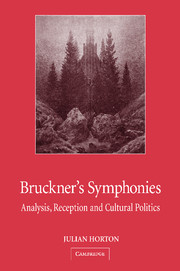Book contents
- Frontmatter
- Dedication
- Contents
- Preface
- 1 Introduction: the critical problem
- 2 Bruckner and late nineteenth-century Vienna: analysis and historical context
- 3 Right-wing cultural politics and the Nazi appropriation of Bruckner
- 4 Bruckner and musical analysis
- 5 Bruckner and the construction of musical influence
- 6 Analysis and the problem of the editions
- 7 Psychobiography and analysis
- 8 Epilogue: Bruckner and his contexts
- Bibliography
- Index
1 - Introduction: the critical problem
Published online by Cambridge University Press: 22 September 2009
- Frontmatter
- Dedication
- Contents
- Preface
- 1 Introduction: the critical problem
- 2 Bruckner and late nineteenth-century Vienna: analysis and historical context
- 3 Right-wing cultural politics and the Nazi appropriation of Bruckner
- 4 Bruckner and musical analysis
- 5 Bruckner and the construction of musical influence
- 6 Analysis and the problem of the editions
- 7 Psychobiography and analysis
- 8 Epilogue: Bruckner and his contexts
- Bibliography
- Index
Summary
Stephen Johnson concluded a recent article about Bruckner and the cultural politics of Nazi Germany with the following exhortation:
What is certain is that as regards performance and textual fidelity, and maybe much else, Bruckner's music stands in urgent need of reassessment … Let's hope that this time it can be done with something like impartiality.
In making such an appeal, Johnson by no means expresses a novel attitude amongst Brucknerians. Protestations of misunderstanding, calls for reappraisal and concerns about the dense problems generated by the music form possibly the most consistent feature of the composer's reception. Perhaps to a greater extent than the music of any of his contemporaries, Bruckner's music has come to be defined by its attendant problems.
The issues comprising ‘the Bruckner problem’ in the broadest sense have been both geographically specific and geographically indifferent. On the one hand, Germanic and anglophone reception histories have followed markedly different paths. The appropriation of Bruckner during his lifetime by the more extreme elements of Viennese Wagnerism, and subsequent right-wing annexations culminating in the Nazification of his music, quickly established the symphonies in the Germanic canon at the cost of a lasting affiliation with fascism. In Britain, by contrast, Bruckner was, until fairly recently, widely regarded as a defective continental curiosity, and despite an increasingly secure place in the repertoire, his defence as a ‘canonical’ composer is often still necessary.
- Type
- Chapter
- Information
- Bruckner's SymphoniesAnalysis, Reception and Cultural Politics, pp. 1 - 25Publisher: Cambridge University PressPrint publication year: 2004



